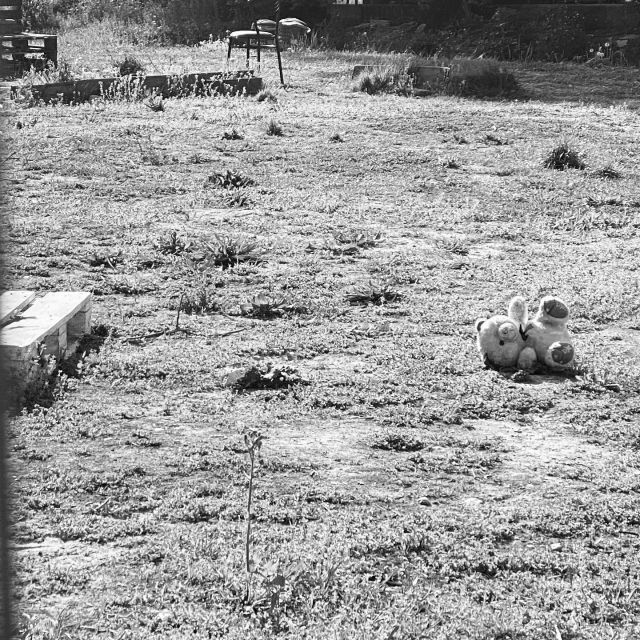[Mostly Weekly #58] The QuaranZine
Mostly Weekly #58
The QuaranZine
La newsletter omonima a margine del canale Telegram
(quella che esce quando è pronta)
A cura di Antonio Dini
Numero 58 ~ 12 aprile 2020
“Then one day you realize,
ten years have got behind you,
no one told you when to run,
you missed the starting gun”
– Mr. Floyd
In questo numero:
- Head/Body
- Tsundoku Regular
- Tsundoku Live
- Tsundoku Poetry Room
 Buona Pasqua – Foto © Antonio Dini
Buona Pasqua – Foto © Antonio Dini
HEAD/BODY
Scrivere per pensare
Intanto, buona Pasqua. Poi: questa newsletter si chiama Mostly Weekly ed è una emanazione del mio canale Telegram Mostly, I Write. Un po' di tempo fa qualcuno mi ha chiesto perché questo nome, "Scrivo, perlopiù", e come l'ho trovato. Il processo è stato lungo: cercavo qualcosa che definisse in maniera sintetica quel che sono prima ancora di quel che faccio. Mi hanno aiutato a riflettere varie persone: tra queste un ruolo chiave l'hanno avuto sicuramente due amici: Roberto R. "Bobby" Corsi e Stilgherrian. In maniera apparentemente indiretta l'ha giocato anche un libro che ho letto una vita fa, Hackers and Painters di Paul Graham.
All'inizio incuriosito che un informatico e imprenditore della Silicon Valley avesse passato un semestre a Firenze a studiare arte (la mia Firenze, vengo da là), poi sempre più affascinato da quel che scriveva in questa raccolta di saggi dedicati alle big ideas from Computer Age. È stato il mio personale incontro con una cultura e una forma di pensiero razionale che non conoscevo. Anzi, il passaggio a un secondo livello intellettualmente più stimolante che non la semplice parte tecnologica fatta di codice e di processori dell'informatica. È stata insomma la scoperta che esiste una cultura informatica; quella che poi ho cominciato a frequentare e che da quasi venti anni cerco di raccontare come giornalista e saggista.
La materia di cui sono fatto io però non è quella. Non scrivo codice, scrivo prosa. È la cosa che so fare e che faccio da sempre. Ancora Paul Graham, in un altro dei suoi microsaggi, riflette sulla scrittura. Racconta che lo fa "accidentalmente", rispondendo a una email. Notando che, se per scrivere un saggio di solito ci mette settimane, questa volta ci ha messo precisamente 67 minuti: 23 per scriverlo e 44 per riscriverlo. È anche un saggio decisamente breve, ma se non ce la fate a leggerlo tutto (perché è in inglese, perché in una newsletter le cose si passano anche in diagonale, perché avete fretta) comunque il nocciolo è nel primo paragrafo.
I think it's far more important to write well than most people realize. Writing doesn't just communicate ideas; it generates them. If you're bad at writing and don't like to do it, you'll miss out on most of the ideas writing would have generated.
Trovo questa affermazione profondamente vera, almeno per quanto mi riguarda. Infatti, sono anche convinto che non siamo tutti uguali e che quindi questa considerazione probabilmente non valga sempre. Tuttavia, per quanto mi riguarda (e per quanto riguarda molti scrittori: Don De Lillo ad esempio ha detto che «Writing is a concentrated form of thinking»), scrivere è una fotografia del mio modo di pensare estremamente precisa e veritiera. Mi ha fatto capire che da questa intuizione deriva il risultato della mia ricerca, cioè il mio motto. Mostly, I Write è il modo migliore per esprimere la sostanza di quel che faccio: scrivere/pensare/generare. L'ho sempre sentito così, un tutt'uno indissolubile. Per me "scrivere" è una attività intellettualmente completa, come fare simbolicamente il pane: seminare, far crescere e mietere il grano, macinarlo, impastarlo e cuocerlo con il lievito, portare il pane in tavola e alla fine mangiarlo. Dentro tutto questo c'è la fatica, l'attesa, la gioia, la scoperta. C'è in buona sostanza il senso di quello che si fa.
Quello che segue invece è il succo in 380 parole di cosa vuol dire scrivere secondo Graham. Ah, alla fine le "simple, germanic words" (contrapposte alle parole inglesi di origine latina) in italiano sarebbero i paroloni complicati, gli -ismi e tutti gli altri modi per far vedere quanto uno è colto.
As for how to write well, here's the short version: Write a bad version 1 as fast as you can; rewrite it over and over; cut out everything unnecessary; write in a conversational tone; develop a nose for bad writing, so you can see and fix it in yours; imitate writers you like; if you can't get started, tell someone what you plan to write about, then write down what you said; expect 80% of the ideas in an essay to happen after you start writing it, and 50% of those you start with to be wrong; be confident enough to cut; have friends you trust read your stuff and tell you which bits are confusing or drag; don't (always) make detailed outlines; mull ideas over for a few days before writing; carry a small notebook or scrap paper with you; start writing when you think of the first sentence; if a deadline forces you to start before that, just say the most important sentence first; write about stuff you like; don't try to sound impressive; don't hesitate to change the topic on the fly; use footnotes to contain digressions; use anaphora to knit sentences together; read your essays out loud to see (a) where you stumble over awkward phrases and (b) which bits are boring (the paragraphs you dread reading); try to tell the reader something new and useful; work in fairly big quanta of time; when you restart, begin by rereading what you have so far; when you finish, leave yourself something easy to start with; accumulate notes for topics you plan to cover at the bottom of the file; don't feel obliged to cover any of them; write for a reader who won't read the essay as carefully as you do, just as pop songs are designed to sound ok on crappy car radios; if you say anything mistaken, fix it immediately; ask friends which sentence you'll regret most; go back and tone down harsh remarks; publish stuff online, because an audience makes you write more, and thus generate more ideas; print out drafts instead of just looking at them on the screen; use simple, germanic words; learn to distinguish surprises from digressions; learn to recognize the approach of an ending, and when one appears, grab it.
 Posti dove tornare a fare colazione – Foto © Antonio Dini
Posti dove tornare a fare colazione – Foto © Antonio Dini
TSUNDOKU REGULAR
Perché, quando si comprano libri e non si leggono ma si accumulano e basta, c'è una parola (giapponese) per dirlo
Ctrl+C, ctrl+V (scrittura non creativa) di Kenneth Goldsmith è un libro ben strano: cerca di trovare il modo per ripensare l'autore e il lettore, alla fine per ripensare il testo. Lo fa in maniera pragmatica, dopo essersi scontrato con il mondo digitale che ha frammentato e trasformato tutto, anche e soprattutto l'atto e l'idea stessa della scrittura, della creatività, dell'autorialità. È un libro speciale, fidatevi.
TSUNDOKU LIVE
Giusto quel paio di vecchi classici che vale la pena ascoltare ancora
The 'Dark Side of the Moon' dei Pink Floyd è un disco che adoro. È uscito nel 1973 ed è stato nella Top 100 di Billboard fino al 1988. L'ho ascoltato dal principio alla fine una marea di volte. Il fatto è che da un lato si tratta di un disco letteralmente ultraterreno, ma dall'altro non arriva certo nel vuoto pneumatico.
1973 was an amazing year for new albums, here are just a few from that year: Pink Floyd 'Dark Side of the Moon', Led Zeppelin 'Houses of the Holy', Alice Cooper 'Billion Dollar Babies', The Mothers of Invention 'Over-Nite Sensation', Brian Eno 'Here Come The Warm Jets', Elton John 'Goodbye Yellow Brick Road' & 'Don't Shoot Me, I'm Only The Piano Player', Mike Oldfield 'Tubular Bells', The Stooges 'Raw Power', Todd Rundgren 'A Wizard A True Star', The Who 'Quadrophenia', The Rolling Stones 'Goats Head Soup', David Bowie 'Aladdin Sane', Black Sabbath 'Sabbath Bloody Sabbath', The Allman Brothers Band 'Brothers and Sisters', Little Feat 'Dixie Chicken', Jackson Browne 'For Everyman', The Eagles 'Desparado', Emerson Lake and Palmer 'Brain Salad Surgery', Rick Wakeman 'The Six Wives of Henry VIII', Stevie Wonder 'Inner Visions', Can 'Future Days', King Crimson 'Larks' Tongues in Aspic', Mott The Hoople 'Mott The Hoople', New York Dolls 'New York Dolls ', Lynyrd Skynyrd (Pronounced 'Lĕh-'nérd 'Skin-'nérd), Yes 'Yessongs' & 'Tales from Topographic Oceans', Bruce Springsteen 'The Wild,The Innocent & The E Street Shuffle' & 'Greetings From Asbury Park New Jersey', Joe Walsh 'The Smoker You Drink, The Player You Get', The Doobie Brothers 'The Captain and Me', Steely Dan 'Countdown To Ecstasy', John Lennon 'Mind Games', Paul McCartney & Wings 'Band On the Run' & 'Red Rose Speedway', Genesis 'Selling England By The Pound' and too many more to list here!
Chi ascoltava i Pink Floyd? E in quale momento della propria vita, soprattutto? Con quale attitudine?
Primo:
I’ve fallen asleep almost every night to DSOTM or The Wall since I was 11 (I’m 50). Easily the best $20 I have ever spent. A clause in my will makes it imperative that a small device that can play both these albums indefinitely (I’m hoping by then tech will accomplish this or just have a solar powered wire run down to me) be placed in my coffin so that I can continue to rest peacefully listening to Pink Floyd. Be kind to one another.
Secondo:
I think I was 10 when I heard this album for the first time in my cousins bedroom, he was 18, sister was 16 my brother was 15, sitting there listening to this song I was scared shitless at the power of this music literally, and at the same time didn’t want the song to end.
Terzo:
Many years ago my life fell apart and I was suffering mental exhaustion and stress. I was a mess. I ended up driving across France with no idea of direction just to “get away” from the UK. I listened to “Dark Side of the Moon” on repeat many many times as I drove. On that day I happened upon a large First World War memorial and grave site. There must have been at least 10,000 buried dead. Later that night I slept under the stars looking at a meteor shower. I think one came down very near me. I realized then, that night all the worry was bullshit in the great scheme of things and I would be ok no matter what! It was liberating. This album reminds me of that over and over again and to me is the great message of the work.
Che dire?
...And this was ALL done with reels of tape, razors and splicing!
TSUNDOKU POETRY ROOM
La stanza della poesia di Mostly Weekly
Alba di Galileo di Pico Tamburini è una raccolta di poesie scritte nel 1994, poco prima della morte dell'autore. Di Pierfrancesco "Pico" Tamburini ho già scritto nel numero 29 di Mostly Weekly per aver egli curato l'antologia La polizia indaga. Uomo di molti talenti, imprenditore e pubblicitario, il Tamburini più vero e profondo è quello delle sue poesie, oggi ingiustamente quasi del tutto dimenticate.
I link non hanno alcuna affiliazione, puntano solo all'oggetto culturale citato.
::END::
Ti è piaciuta? Inoltrala a chi potrebbe essere interessato.
Se l'hai ricevuta, qui puoi iscriverti
Se vuoi cancellarti (subito, rapidamente e per sempre) il collegamento invece è più sotto.
Qui invece c'è l'archivio dei numeri passati
Buona domenica!